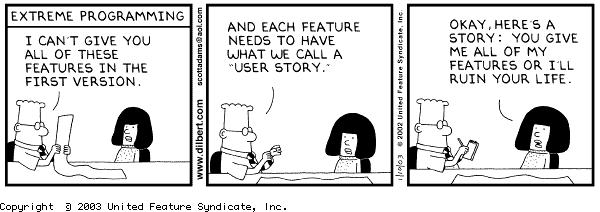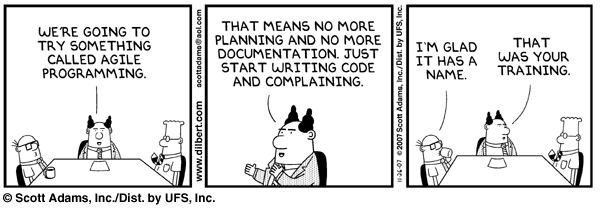Recent posts on Reddit have pointed to a number of Dilbert comic strips poking fun at extreme and agile programming; I thought I’d gather them in one place. Here they are, posted for your enjoyment (for as long as I escape the notice of United Feature Syndicate):




24 replies on ““Dilbert” on Extreme and Agile Programming”
[…] 29 November 2007 software Tags: dilbert, extreme programming You know you’ve made it when they make fun of you in Dilbert. I wonder how long before the United Features lawyers make Joey take the cartoons […]
it’s so funny because it’s so true
[…] Global Nerdy » Blog Archive » “Dilbert” on Extreme and Agile Programming “Dilbert” on Extreme and Agile Programming (tags: xp) […]
[…] “Dilbert” on Extreme and Agile Programming Publikasi: August 21, 2009 Pengelompokan: Agile Tags: Extreme Programming Tinggalkan […]
Well, everyone who thinks that Agile programming means no planning nor documentation has no clue what it is. Really.
Ben, love – you seem to have lost your sense of humour.
Ben has drank the Kool-Aid
Well Agile in the real world is loads of fun. ;)
http://geekykarma.com/comics/agile-in-the-real-world/
“Well, everyone who thinks that Agile programming means no planning nor documentation has no clue what it is. Really.”
true, but it’s still funny :D
dan you are an idiot man.
Xtreme programming doomed itself to stupidity when it chose to call itself “Extreme”. “Extreme” is a word used to sell sports drinks and sports videos to people that don’t mind being shouted at whilst eating doritos on the couch.
[…] Agility is a term that is applied to everything from sports to dog shows, and everything in between. More recently, agility has been used to describe engineering methods, including software. In the mid-1990s, “lightweight” software methods gained some traction, aided in part to the growth of object oriented analysis and design. Finally in 2001, the term agile was ratified as a software development approach and described in the Agile Manifesto (and Dilbert). […]
Not true of what Agile proposes, but soooo true regarding organisational understanding and misuse. Agile is now the byword for bad project management and schedule issues…
Oh you poor younger programmers.
I’m 66 years old and have been programming for 42 years. Have so many successful projects behind me that I’ve forgotten most of them. My advice is ignore all buzz words, ignore all methodologies and just get back to your desks and do what you do best and that is write code. If you have a manager that tries to implement any of these methodolgies, scrum, agile, extreme (I almost barf when I thing about it) pair programming (somebody shoot me, or better yet the person I’m pairing with), then run for the nearest door and find a company that cares about results and frowns on bullshit processes.
Hans
PS, I’m really sorry you guys couldn’t find real carreers, programming, ye gads what a soul robbing way to spend your lives.
Agile is the biggest scam yet perpetrated on the technically illiterate corporate masses.
Agile is an absolute scam. In theory it sounds great. In practise, executives and managers use it as an excuse to ignore planning and documentation. The result is chaos. Right back to a CMM Level 1 organization. I’m a project management consultant and I’ve worked at dozens of organizations, large and small, public and private. The ones that use waterfall methodologies run projects that come in at double the original budget and twice the original elapsed time. Agile projects come in 4 times the original budget and 4 times the elapsed time (if they ever manage to limp to the end before they’re terminated for non performance).
Waterfall, for all its faults, supported by reasonable change management discipline and good project management is STILL the lesser of two evils.
Agile has made a miraculous change in the large banking firm I work for. The silly Gant charts and bogus schedules from all the PMP-certified folks have given way to actual productive results. We’re saving millions and actually creating valuable product in weeks instead of years.
[…] Extreme Programming […]
Agile is a complete scam! Basically it is “devised” to squeeze the last drop of effort from developers (at the price of their health, which nobody cares about) and to transfer managerial responsibility over to the “self-managed teams”. Also, to make most dumb developers believe that they are in control. Besides the obvious reason of creating a bunch of useless “agile instructors” and charging for this nonsense, so that some technically impaired guys and gals can get into the great success that software is, it is a very convenient tool for secretly imposing managers’ opinions and making the team believe that they lead the way. How is this done? By “injecting” managers’ ideas during retrospective and the “what could be better part”. At this point in time, someone close to management will jump up and scream some idiotic “great idea” (usually something about doing more work in less time, wow why am I not surprised) and “non-managers” like scrum masters and product owner will heartily support it and hint at everyone else that you better support this or else. What else, oh yeah, during planning the same key ideas are pushed onto developers by “injectors”, for example the idea that you can do design and development tasks in hours (always with an upper limit, supposedly for your own good). Nothing good can come out of this circus and it will only make people leave the industry for some more reasonable jobs.
Agile is the latest attempt by those who bring us the buffer-overflow vulnerability of the hour (because they’re not smart enough to use a language in which buffer overflows are impossible) to call what they do “software engineering”.
While the Agile method itself can be very effective when implemented properly, this list of comics does show a lot of the management and team issues that come with it. This is not a fault of Agile it just needs to be properly implemented based on the product and the team.
It is fun to look back at this. Note that Dilbert is generally about the disjunction between engineering and management. Agile is quite a bit about this too. It is not (if you read the founding docs etc.) the “scam devise to squeeze the last drop of effort out” though management may turn it into that and now that DevOps is the current hot thing a similar process is employed because development always costs too much and takes too long. Part of that is because business asks for things it “needs” but it doesn’t have an ROI model for…thus you spend but is there a return? But back to the “last drop” a key principle in XP is the 40 hour work week. It is about people, that is why the focus is on “individuals, interactions, and collaboration” as stated in the manifesto. Strip two in the sequence…that is the crux of the problem.
It really depends on a personality of a Scrum Master that facilitates Agile on your team.
An experienced Scrum Master can make a huge difference in the dynamics and performance of an Agile team. However, with the broader Scrum adoption, there are some poorly trained specialists out there who do not fully understand Scrum.
We came up with 100 Scrum Master interview questions and 10 scenarios to reveal an in-depth understanding of Scrum: https://standuply.com/blog/scrum-master-interview-questions/
[…] Dilbert on Extreme and Agile Programming : Global Nerdy […]